Avocado Dreams, Floral Realities
In 1998, Jason Kendall took over Kendall Farms and has continued to guide the business into a new direction, while keeping true to the business originally started by his father, who died in 2004.
In 1987, David Kendall purchased 50 acres of farmland in Fallbrook moving his family from the Los Angeles area to the sunny San Diego mountains. Originally, the plan was to have an avocado farm, however, avocados need a lot of water to grow, and water was expensive, so David started to look for another plan.
He met a man who had a flower farm, and he inspired the switch to growing flowers. With the help of his family, David began Kendall Farms.
“It was [somewhat of] a family effort, but I mean, we were really small when I first got involved. We had maybe 20 or 25 employees, mostly field workers, and such. It was mostly my dad and then myself out here on the weekends, and then his group of guys helping him,” son and Chief Pilot [CEO] Jason explained.
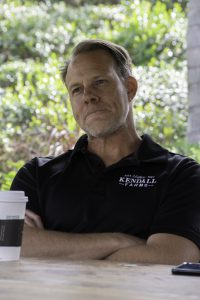
CEO Jason Kendall of Kendall Farms. Emily Whetstone/IMPACT
A New Direction
Jason is no stranger to the California landscape. He was born in Pasadena and spent most of his childhood in the outskirts of the big city. As a kid, he enjoyed skateboarding around the Los Angeles concrete jungle. When he was 13 years old, he moved with his family to Fallbrook after his father, David, purchased the farmland, trading blacktop for dirt.
Since the farm started out as a family effort, Jason spent a lot of his later childhood and early teenage years out in the fields.
“When my dad first bought the farm, I was out here, horsin’ around, you know, with my ATV and having fun, then doing projects here and there with my dad and helping him out, like getting on the tractor, helping plant fields, and all that stuff,” Jason said.
For a while, it wasn’t something he saw himself doing for a living, it was just something he did to help his family out.
As he got older, he started thinking about what he wanted to do for a living. Although he wasn’t initially interested in running the farm full time, his first steps into a career path didn’t stray too far from his agricultural background.
“I looked at property management, our family has real estate properties, so my initial idea was to go into that,” Jason said. After learning about property management and testing the waters, he realized it wasn’t for him. “I did a little bit of an internship on that early on and I did not like it at all.”
Jason decided to go to college at Point Loma Nazarene University in San Diego, studying Business, Management and Marketing, among many other subjects as well.
While in college, Jason needed an internship as part of his program. Lucky for him, he didn’t have to look very far. “The best thing for me was to come help out on the farm. I started working on the sales side and interning and helping out.” It was there where Jason discovered his passion for sales and marketing.
Jason graduated college in 1998 and continued to work on his family’s farm in many sections including: delivery, sales and practically everything else. Soon after, he married his wife Danielle and the two moved onto the farm, as Jason became the general manager of Kendall Farms.
Even though Jason had years of experience working on the farm in all of its vessels, he wasn’t quite sure what to do when he became the head of the business.
“I didn’t know what I was doing. I was just trying to grow the business more in sales and marketing,” Jason said. “We were just selling to brokers in the area, and I really wanted to grow and expand the business across the country, and go into trade shows and expand there.”
Trials and Tribulations
In 2007, the biggest struggle hit the business.
The notorious Rice Fire broke through the Fallbrook community that year, and Kendall Farms took a huge loss, losing 75 percent of their crops. While it was a devastating hit to the company and their staff, the team never lost hope.
“We learned a lot from that, and there’s a bunch of stuff that we did after that fire that gave us a clean slate to start over with,” Jason continued, “We had to cut back half the people, sales were cut in half, we had to outsource product, and we had to really get lean and rebuild from there. But we learned a lot from that, and came out of it even stronger and better, so it was a blessing in the long run. It was hard, I don’t recommend it, but those are challenges that are good if you can come out of it with a good attitude rather than “Oh woe is me” or “Oh poor us.” It’s a good thing that happened, because this is what we got out of it and became from it.”
Jason continued to remain optimistic about the future of Kendall Farms and the agriculture industry.
“As we go into the future, our labor costs are going up, so there’s certain crops that are not as profitable that will be eliminated, and so a real focus on certain crops that make sense, over the next five to 10 years,” Jason explained.
With the increased labor costs, many companies are looking more into the technological advances of the agriculture industry. Automation is becoming more and more of a reality, allowing for quicker production of goods.
While Kendall Farms has remained a top local competitor in the flower business, they’ve also pushed their focus somewhere else: community culture.
“We have a great culture, I think that’s our biggest attraction,” Jason continued, “People really do make a huge difference here, compared to a bigger business where it can be hard. For us, we’re still a tight knit family, and it affects our culture too, and that’s a big deal.”
A Changing Landscape
In the world of advertising, a huge adversary to many businesses is successful marketing. The consumer market is flooded with new business and advertisements every minute, and many companies now have to work harder to find a way to stand out in a large industry.
A large source of not only income, but attention to the farm has come from Target, the $62 billion retailer. With the vision of President Troy Conner, the team created a program to stay involved with the growing business.
“We provide a turnkey program. We make all of the merchandising, so the racks and things like that,” Sales Director Cathy McClintock said, “So, when we put together a package we really get to understand the customer and bring the whole thing. And then we brought in, a couple years ago, a merchandising program, or trainer program, that actively go out into the stores to help them understand the best practices of floral. So, we’re not merchandisers, we don’t go in there every day and do it all for them, but really it’s to teach their staff how to put out the best product out there.”
With the steady expansion into more commercial retail markets, Kendall Farms has stayed grounded to the roots of what the Kendall family started 25 years ago.
“It’s like our own mini city down here, I mean I’m coming down the road and you wouldn’t even know that this was here,” McClintock noted, “It’s a lot of fun, because it’s somewhat of the wild wild west, and you see that as you go.
Aside from just working with companies like Target and Trader Joe’s to send bouquets that are enjoyed by customers, they also sell bulk product to wholesalers and floral shops to make their own arrangements.
Since becoming the head of the company, Jason has proved his dedication and determination to the business his family started, and continues to strive for growth in the industry.
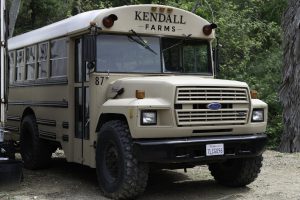
Kendall Frams bus, used to take large parties around the farm and for tours. March 25th. Emily Whetstone/ IMPACT
For the Greater Good
Another busy sector of the farm is The Outreach Farm Project, which was founded in 2009 by Conner, and has been nothing short of a success.
After the U.S. recession, the business was hearing about a consistent need for food in local food pantries, and their severe struggle to help the devastated communities.
“They didn’t have enough [food] to give to everybody,” Conner noted as his inspiration to take the reins on a new project. “At the time we were farming organic flowers, particularly sunflowers, and so I went to Jason and said ‘You know, if we can grow organic sunflowers we should be able to grow some food.'” Jason agreed and gave Conner the official seal of approval to begin the Outreach Farm Project.
For the kick off event, Conner reached out to Rancho Community Church in Temecula. Kendall Farms provided the land for the crops and many volunteers from the local church spent their free time contributing to the effort. In the first year of operation alone, the rescue mission produced around 35,000 pounds of produce.
The outreach created a farm stand that operates on Sundays at Rancho Community Church.
“In the peak of the season, we produce so much food in those middle of summer weeks that the food pantries can’t handle it all. Then we opened up the produce stand at Rancho, and they take the donations for the excess and that goes right to the rescue mission, and that generates between $10,000-$11,000 per year. We grow about 60,000 pounds per season and we also generate about $10,000 of funds for the rescue mission,” Conner said.
Being able to sell some of the produce allows the program to generate some money to donate back to those organizations.
This year, Outreach Farm Program will be starting their eleventh year of operations, and with the land and the labor, they now average 60,000 pounds of fresh produce each year, and that all gets distributed around California.
“We’re reaching not just places like Temecula Rescue Mission, Fallbrook Food Pantry, etc. We supply all the way up into Hemet, Ramona, and Lake Elsinore. We supply up to 10 or maybe more rescue missions and pantries,” Conner explained.
Additionally, Kendall Farms has also partnered up with a charity called Samaritan Aviation. The organization operates a small airplane that flies between the United States and Papua New Guinea, providing medical aid to people in need of medical services.
The farm was interested in assisting the charity after a close friend of Jason’s started it up, and the business has been a supporter of the charity ever since its establishment in 1999.
Kendall Farms has done its share for the community, and there’s no stopping them now.
“It’s been incredibly rewarding to see the impact. We get letters once in a while, and we see the look on people’s faces when we’re able to impact people’s lives in a positive way, and it makes it worthwhile,” Conner said.
Bright Future Ahead
Even though Kendall Farms has big plans for the future, they remain as a local business making waves in San Diego, with Jason noting that:
“We can’t compete with these bigger companies, so what can we give that’s different? What can we do to create a place where you will be impactful? Where you can make a difference, and not just be another number?”

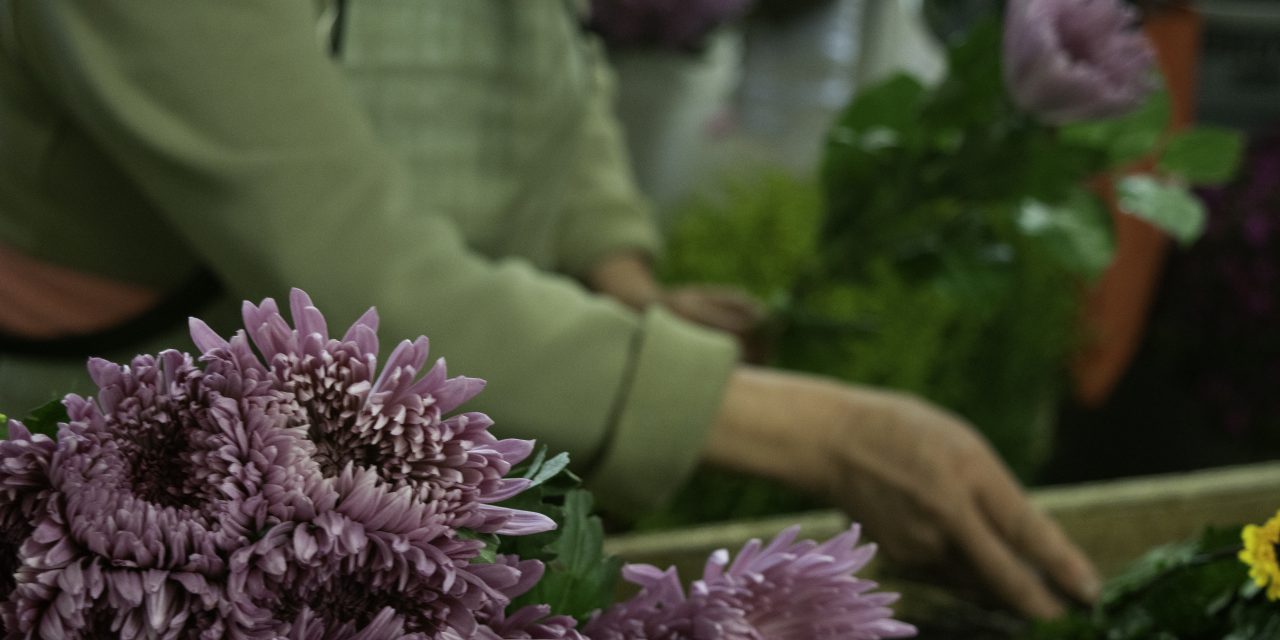
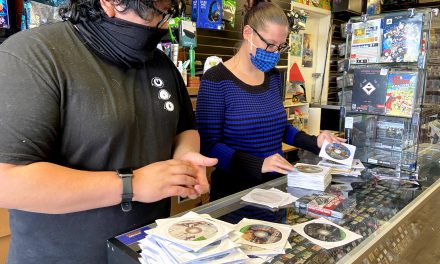


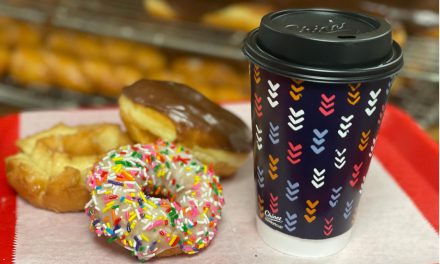
Recent Comments